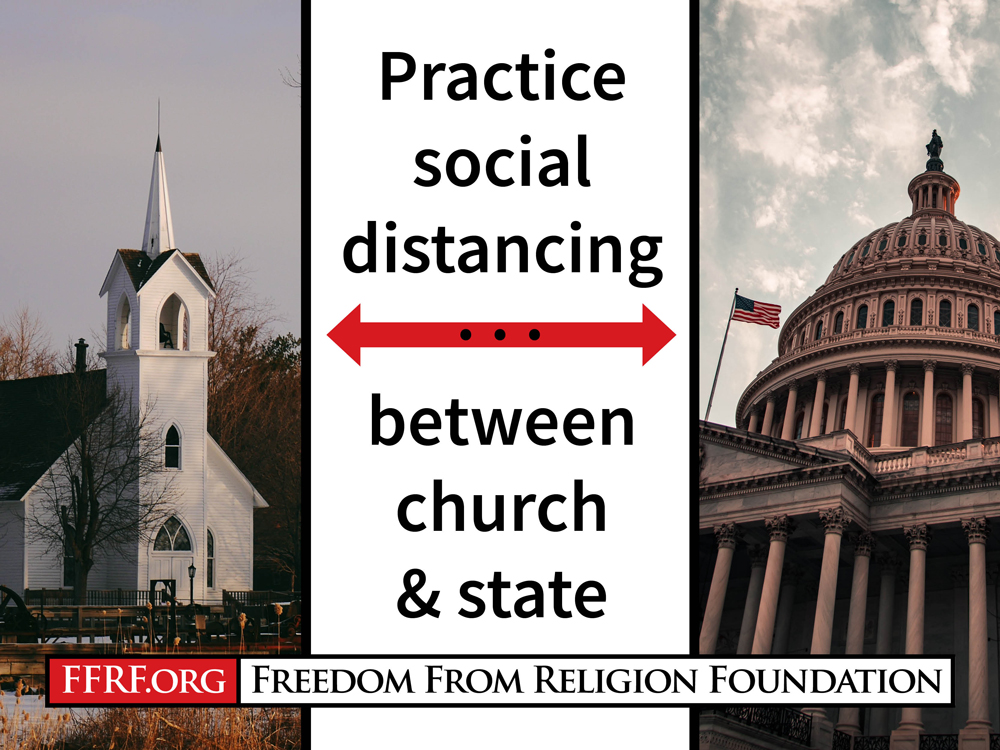
The Freedom From Religion Foundation is raising its voice against the Trump administration’s unconstitutional massive bailout of houses of worship.
The national state/church watchdog is conveying its formal objections to public bailouts of churches to the Small Business Administration during the public comment period ending on Friday.
Estimates vary, but FFRF notes that hundreds of billions of taxpayer dollars could flow to churches with the rules the Small Business Administration has implemented for round one of the stimulus package. FFRF’s comment cites Christianity Today, which estimates that churches “could easily capture one-third of the entire $350 billion allocation.” Between 12,000 and 13,000 of the 17,000 U.S. Catholic churches applied for loans, and 9,000 received them — despite the Vatican’s own bank and priceless collection of art. (If these churches got average loans, that’s more than $1.4 billion of public money flowing to an organization that has institutionalized the rape and abuse of children, covered up those crimes, and done all it can to prevent victims seeking justice.)
There are at least four major flaws in the interim final rules that the SBA has proposed, FFRF points out.
First, doling out taxpayer funds to houses of worship violates the First Amendment.
“One of this country’s first religious freedom laws, the Virginia Statute for Religious Freedom, warned that taxing citizens and giving the money to churches is ‘sinful and tyrannical,’” FFRF writes to SBA Administrator Jovita Carranza. “That law provided the intellectual and moral foundation for the First Amendment and our godless and secular Constitution.”
If churches get even a single cent from the public treasury, then the government is violating the religious liberty of every American, FFRF maintains. SBA’s own regulations already state that entities “principally engaged in teaching, instructing, counseling or indoctrinating religion or religious beliefs, whether in a religious or secular setting” aren’t eligible for SBA funds. Other than to allow nonprofit organizations to receive funding, the CARES Act (the first stimulus package) did not amend any regulatory restrictions on SBA loans to small businesses. Nor can a statute be read as permitting the SBA to violate a core constitutional tenet of this republic.
Second, FFRF maintains, where taxpayer funds go, there must be accountability and transparency.
“As part of their public trust, 501(c)(3) nonprofits file an annual report with the IRS that details specific financial information,” the letter states. ‘Every penny donated and spent is tracked in the Form 990, which is filed with the IRS. Unlike other 501(c)(3)s, churches are not required to file anything. They are financial black holes.”
And to make matters worse, churches qualify for CARES Act funds even if they’ve never registered as a church with the IRS, according to the SBA’s guidance. Receiving these taxpayer funds could be literally both the first and last time the government ever hears of them.
Third, taxpayer money should not support religious discrimination, FFRF contends.
Current SBA regulations require that recipients of SBA loans “to reflect to the fullest extent possible the nondiscrimination policies of the federal government.” However, it has also issued a guidance casting aside these protections, stating that “no faith-based organization will be excluded from receiving funding because … employment by the organization is limited to persons who share its religious faith and practice.” This guidance incorrectly portrays the religious exemption as significantly broader than SBA’s regulations. Treating religious belief as a license to discriminate violates the First Amendment.
And, FFRF asserts in its final point, there is no valid religious freedom rationale for the SBA to exempt churches from its standard affiliation rules — and doing so will lead to churches double-dipping for these loans.
Churches are able to exempt themselves from affiliation rules when it comes to stimulus funds by simply claiming religious freedom. For instance, a Catholic school could get a loan, as could the church that runs the school. So the school could get double counted when calculating the loans. Then the local parish could claim both the school and the church in its application, triple counting the school and double counting the church. The diocese could get a chunk of funding that includes that parish, the church, and the school. So might the archdiocese — and on up.
The SBA justifies this exemption by relying on the Religious Freedom Restoration Act, but its interpretation is flawed. The Act does not give the SBA the authority to create blanket exemptions. And the larger issue is that churches and other religious organizations should only qualify if they can show that they are financially independent of their parent entity.
“The White House has distorted the rules beyond belief to make sure that its religious base gets massive handouts at taxpayer expense,” says FFRF Co-President Annie Laurie Gaylor. “In the process, it has violated our basic constitutional tenets.”
The Freedom From Religion Foundation is trying its best to make certain that the Trump administration is adhering to the U.S. Constitution.

